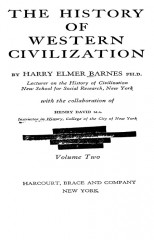
Author : Barnes Harry Elmer
Title : The history of western civilization Volume 2
Year : 1935
Link download : Barnes_Harry_Elmer_-_The_history_of_western_civilization_Volume_2.zip
Preface. This book is a straightforward account of the development of institutions and culture in the Western world. It is not based upon any preconceived notion of social evolution, nor have I been governed by any rigid schematic conception of historical interpretation. There is no assumption of invariable or uniform "stages" in history. The book has been built upon two main convictions. The first is that the history of civilization must be founded upon a broad perspective of time and space that cannot be secured from history alone, but must be grounded in biology, archaeology, anthropology, and sociology as well. The second is that the whole story of human develop ment should be told. Qualifying this, however, is the belief that one must not try to lay exactly the same emphasis on each department or phase of culture in every period of human development. In some epochs the mere struggle for existence has been most important. In others religion has loomed largest in the interest of peoples. In another age the struggle for wealth and power has been dominant. Among some peoples, art and things of beauty have seemed to possess most significance. When treating a particular people in any era, I have attempted to stress especially the most characteristic and illuminating traits of that age and civilization. Likewise, while all peoples who have played any prominent part in the development of Western civilization have been mentioned, considerations of common sense and space alike dictate that major attention should be given to those areas and populations through which the stream of Western culture has flowed most directly and continuously from the caves of the Old Stone Age to the metropolitan centers of the twentieth cen tury. Peoples and regions on the periphery of this main stream of Western culture are dealt with only in so far as they have contributed their rivulets to the general current of cultural tradition in the West. While they have not been followed slavishly, two elaborate syllabuses form the basis of the organi zation of the book: my Social History of the Western World (Appleton, 1921) ; and An Outline of the History of the Western European Mind, by James Har vey Robinson, which I revised under his supervision in 1919 (Marion Press, 1919). I have also found very helpful and suggestive the Guide to the History of European Civilization prepared by the members of the department of his tory of the College of the City of New York (1932). The history of Western civilization cannot be confined within the older historical chronology. It is now realized that man has been on the earth for at least a million years, and some learned students estimate that he has been here for a much longer period perhaps three times as long. Hence, even in the most modest estimate, far more than 90 per cent of the period of human habitation of this planet had already passed before the arrival of what used to be known as "the Dawn of History." If we were to use the old categories of historical chronology, we would have to identify ancient history with the Eolithic and Paleolithic periods of the early Stone Age; medieval history with the Neolithic or New Stone Age; and modern history with the period since the appearance of civilization in early Egypt. From the standpoint of time and culture alike, the whole civilization of man in the West since ancient Egyp tian days is "modern"; in character. The term "contemporary history" might well be applied to the relatively novel culture that has arisen since 1700 as a result of the growth of science, invention, business enterprise, and world-trade. In order, however, not to clash too sharply with the conventional historical perspective and pedagogy, I have attempted to adapt the new chronological conceptions to the old terms, and one will still find in these pages references to ancient history, classical civilization, the Middle Ages, and the like. In the light of rigorous historical logic it would probably have been better to abandon all the old chronological designations, but it has been deemed inexpedient to do so. In describing the so-called prehistoric period, special emphasis has been placed upon the rise of the arts connected with assuring material existence, the origins of human social groupings, and the beginnings of man s theories about the supernatural world. The ancient Orient is portrayed as the geographical area and historical period that witnessed the origins of civilization, built up by a leisure class on the basis of the oppression and exploitation of a large servile group. It was also the period in which there first emerged large-scale political units founded upon territorial residence rather than real or fictitious kinship. The two civilizations of the ancient Mediterranean world diverged widely in character. The Greeks introduced skeptical thought, an appreciation of the true and the beautiful, and a secular outlook upon life. The Romans were more notable for their achievements in military conquest, administration, jurisprudence, and engi neering. The Greeks were intellectual innovators; the Romans, imitators. The medieval period was marked by a revival of supernaturalism, the dom inance of agricultural society, political localism and decentralization, and the degradation of scholarship. But it was not a uniform cultural age, for growth and development characterized nearly every element of its civilization. The rise of urbanism and the middle class foretold the coming of the modern period in which political centralization, nationalism, representative govern ment, imperialism, science, machines, secularism, and capitalism and its attend ant organized exploitation and economic waste have been dominating traits. The importance of the various elements in civilization thus shifts with the different epochs of history and the historian must, accordingly, allot his space and diversify his treatment with appropriate discrimination. To give as much attention to religious items in the twentieth century as in the thirteenth would, for example, be absurd. The theory of historical causation underlying the treatment in this book is a very broad one, based upon the primary obligation of being true to the facts and thoroughly aware of the shifting trends of cul tural development throughout the ages. ...

Palmer Michael - Hiroshima revidiert
Author : Palmer Michael Title : Hiroshima revidiert Die beweise für napalm und senfgas anstatt...














